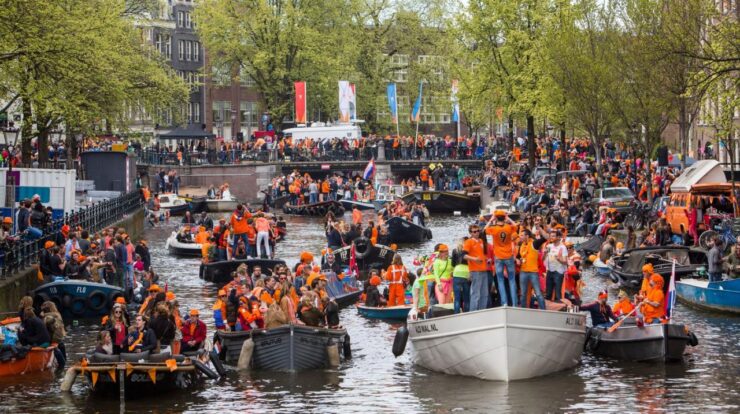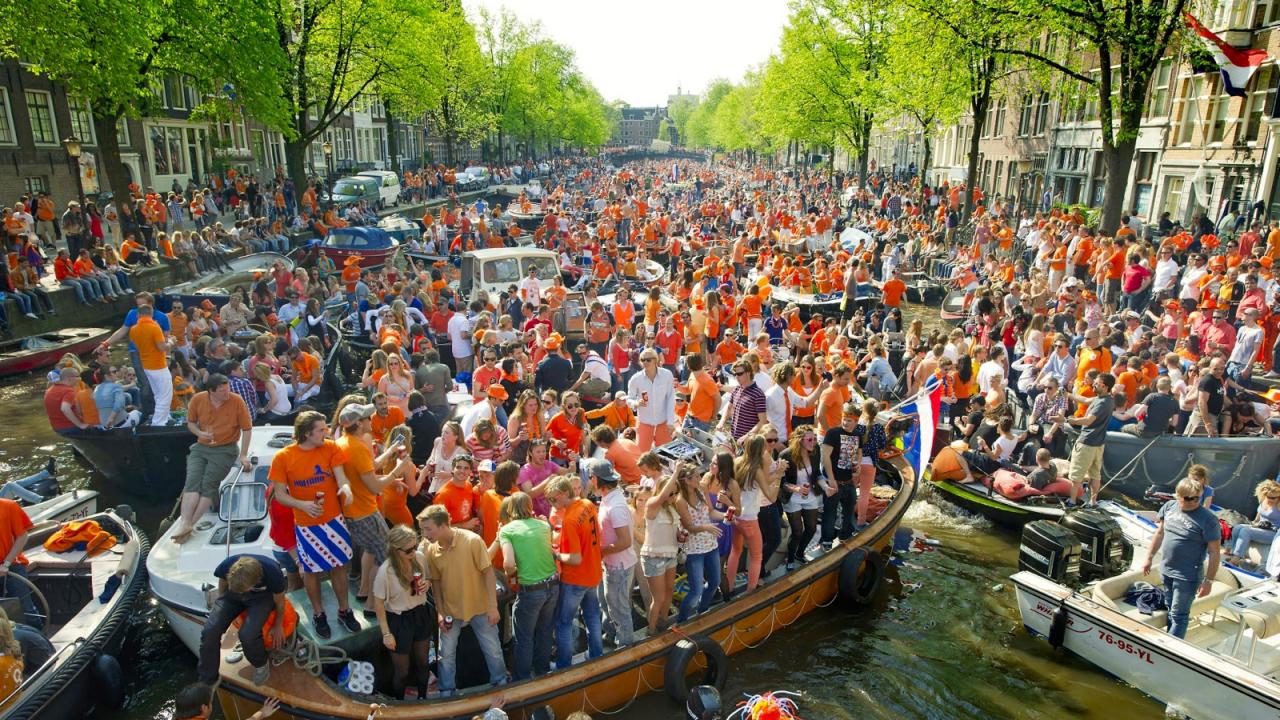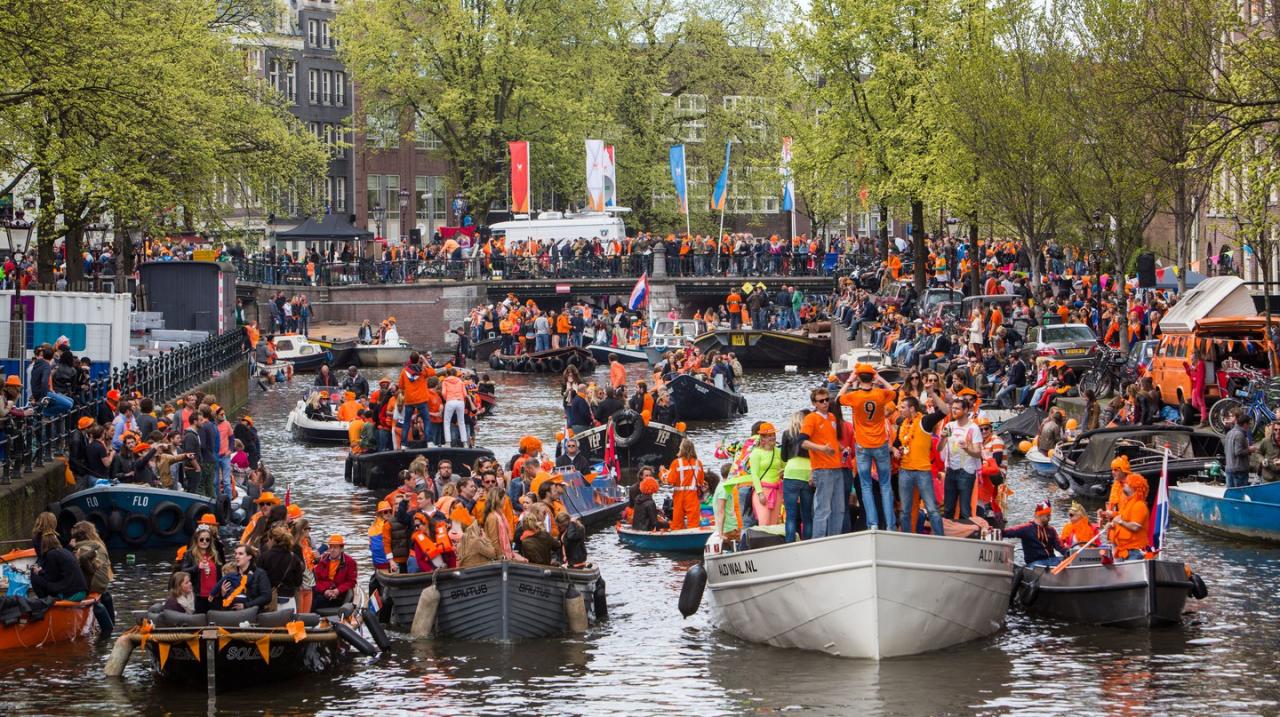
Netherlands Kings Day, an annual celebration held on April 27th, is a vibrant and colorful event that embodies the spirit of Dutch national unity and pride. Rooted in centuries of history, this beloved holiday transforms the Netherlands into a sea of orange, where streets come alive with festivities, flea markets, and live music, creating an unforgettable atmosphere that captivates both locals and visitors alike.
The origins of Kings Day can be traced back to 1885, when it was first celebrated as Queen’s Day in honor of Queen Wilhelmina’s birthday. After the accession of Queen Juliana in 1948, the date was changed to her birthday, April 30th.
In 2013, following the coronation of King Willem-Alexander, the holiday was renamed Kings Day and moved to April 27th, his birthday.
History of King’s Day in the Netherlands

King’s Day in the Netherlands is a national holiday celebrated on April 27th. It was originally known as Queen’s Day to honor Queen Wilhelmina, who reigned from 1890 to 1948. After Queen Juliana succeeded her mother in 1948, the holiday was renamed Queen’s Day and continued to be celebrated on her birthday, April 30th.
In 2013, King Willem-Alexander ascended to the throne, and the holiday was renamed King’s Day and moved to his birthday, April 27th.
King’s Day has a long and rich history, dating back to the 16th century. In 1579, the Union of Utrecht was signed, which established the Dutch Republic. The first official celebration of King’s Day was held in 1885 to commemorate the 50th anniversary of King William III’s reign.
Over the years, King’s Day has evolved into a major national holiday. It is a day of celebration, music, and orange-themed festivities. The entire country comes together to celebrate the king and the royal family.
King’s Day Celebrations
King’s Day is a day of celebration throughout the Netherlands. The entire country comes together to enjoy music, food, and orange-themed festivities.
One of the most popular traditions on King’s Day is the vrijmarkt, or free market. On this day, people are allowed to sell their used goods without a permit. Vrijmarkten are held all over the country, and they are a great place to find unique and affordable items.
Another popular tradition on King’s Day is the oranje tompouce, or orange pastry. This pastry is made with a puff pastry base, filled with orange cream, and topped with orange icing. Oranje tompoucen are a delicious way to celebrate King’s Day.
In addition to the vrijmarkt and the oranje tompouce, there are many other ways to celebrate King’s Day in the Netherlands. People often gather in the streets to listen to music, dance, and enjoy the festivities. There are also many organized events, such as concerts, parades, and fireworks displays.
Cultural Significance of King’s Day, Netherlands kings day
King’s Day is a day of national unity and pride in the Netherlands. It is a day to celebrate the king and the royal family, as well as Dutch culture and heritage.
The orange color is a symbol of the Dutch royal family. It is also a symbol of the country’s independence and unity. On King’s Day, people wear orange clothing, decorate their homes and businesses with orange flags and streamers, and even dye their hair orange.
King’s Day is also a day to celebrate Dutch culture and heritage. People often wear traditional Dutch clothing, such as wooden clogs and lace bonnets. There are also many traditional Dutch games and activities that are played on King’s Day, such as ring toss and sack races.
Economic Impact of King’s Day
King’s Day is a major economic event for the Netherlands. In 2019, the holiday generated an estimated €700 million in revenue. This revenue comes from a variety of sources, including tourism, retail sales, and food and beverage sales.
Tourism is a major driver of the economic impact of King’s Day. Many tourists visit the Netherlands during the holiday to experience the festivities and celebrate with the Dutch people. In 2019, an estimated 1.5 million tourists visited the Netherlands on King’s Day.
Retail sales also increase significantly on King’s Day. Many people take advantage of the holiday to buy orange-themed clothing, decorations, and other items. In 2019, retail sales increased by an estimated 10% on King’s Day.
International Recognition of King’s Day
King’s Day is not only celebrated in the Netherlands. It is also celebrated in other countries with a Dutch heritage, such as Suriname, Aruba, and Curaçao. In addition, there are many King’s Day celebrations held in other countries around the world.
One of the most popular international King’s Day celebrations is held in New York City. This celebration is organized by the Netherlands Society of New York and attracts thousands of people each year. The celebration includes a parade, a vrijmarkt, and a variety of other activities.
King’s Day is also celebrated in other cities around the world, such as London, Paris, and Berlin. These celebrations are often organized by Dutch expatriates and are a way for them to connect with their Dutch heritage.
Visual Representation of King’s Day
|
People celebrating King’s Day in Amsterdam |
A vrijmarkt on King’s Day in the Netherlands |
People dancing and celebrating King’s Day in Amsterdam |
A group of people celebrating King’s Day in a park in Amsterdam |
King’s Day in the Media
King’s Day is widely covered in the Dutch media. Newspapers, magazines, and television channels all feature stories about the holiday. The media often focuses on the positive aspects of the holiday, such as the sense of community and the celebration of Dutch culture.
However, the media also covers the negative aspects of King’s Day, such as the excessive drinking and littering. In recent years, there have been concerns about the safety of King’s Day celebrations. In 2019, there were several reports of violence and sexual assault on King’s Day.
Social media also plays a major role in shaping public perception of King’s Day. People often share photos and videos of their King’s Day celebrations on social media. This can help to create a positive image of the holiday and encourage others to participate.
Future of King’s Day
The future of King’s Day is uncertain. The holiday is facing a number of challenges, such as changing societal norms and values. In recent years, there has been a decline in the number of people who celebrate King’s Day. This is likely due to a number of factors, such as the increasing popularity of other holidays and the changing demographics of the Netherlands.
Despite these challenges, King’s Day remains a popular holiday in the Netherlands. It is a day to celebrate the king and the royal family, as well as Dutch culture and heritage. The future of King’s Day is uncertain, but it is likely that the holiday will continue to be celebrated for many years to come.
Final Review: Netherlands Kings Day

Kings Day is not only a celebration of the Dutch monarchy but also a testament to the strong sense of community and national identity that unites the people of the Netherlands. The day’s festivities provide an opportunity for citizens to come together, embrace their shared heritage, and revel in the vibrant culture that makes their country so unique.
As the Netherlands continues to evolve, Kings Day remains an enduring tradition that embodies the spirit of the Dutch people and their unwavering commitment to unity, pride, and the celebration of life.
Commonly Asked Questions
When is Kings Day celebrated?
Kings Day is celebrated annually on April 27th.
What is the significance of the color orange on Kings Day?
Orange is the color of the Dutch royal family, the House of Orange-Nassau, and has become synonymous with Kings Day celebrations.
What are some of the traditional activities associated with Kings Day?
Kings Day is celebrated with a variety of activities, including flea markets, street parties, concerts, and live music.





